Lewis Hamilton's deserved title hides the lessons F1 must learn
- Published
All in all, 2014 will go down as a very good Formula 1 season indeed.
The fears at the start of the season - that cars would struggle to finish the races, that drivers would have to back off enormously to make the fuel last - were unfounded and there was some fantastic wheel-to-wheel racing and a fascinating battle for the world championship which went down to the last race.
Admittedly, that battle was between two drivers from the same team, but in some respects that is to be expected given the sport also had new regulations this season. In such situations, quite often one team gets it more right than the rest.
Several young drivers emerged who will be leaders of the next generation of stars, and there were some great stories, including the return of Williams to the front and the continued struggles of Ferrari.
But it was not all good news.
The terrible injuries suffered by Jules Bianchi will always cast a pall over the season. And even beyond that there were times when the off-track action felt like it might overshadow the racing - whether it be the struggles of Caterham and Marussia or the ongoing arguments over money.
THE STARS OF THE SEASON
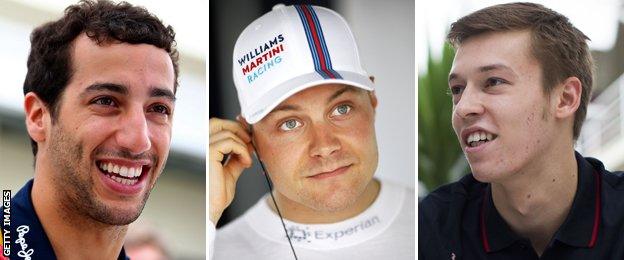
Daniel Ricciardo (left), Valtteri Bottas (centre) and Daniil Kvyat all impressed in 2014
The future of Formula 1 looks bright, with a new generation of drivers emerging to challenge the established stars.
After the first race of the season, I wrote about the potential of Daniel Ricciardo, Valtteri Bottas and Kevin Magnussen. And we can now add Daniil Kvyat to that list as well.
Ricciardo and Bottas will be fighting for world championships in the not too distant future, I am sure of that.
And I am very much looking forward to seeing how Kvyat gets on at Red Bull alongside Ricciardo next season, because joining a big team increases expectations on both sides - the driver's of the team and the team of the driver. I suspect he will grab hold of it well, in a similar way to Ricciardo.
It was a mixed season for the established stars.
The battle between the two Mercedes drivers was fascinating, not least because it seemed to be an inversion of their seasons in 2013.
A year ago, Lewis Hamilton had the upper hand in qualifying but Nico Rosberg was often better in races, with tyre management and so on.
This season, that turned around. Rosberg out-qualified Hamilton but Hamilton was far better in races - to the extent that he even had better fuel consumption, which I did not expect.
Hamilton was perhaps helped by the tyres being more robust this year, so he could race hard, which he did exceptionally well on many occasions.
Rosberg was very clinical in qualifying. He used all the information at his disposal - a lot of which would have been Hamilton's - to get himself to the point where going into the last part of qualifying his first run was pretty much on the button, which put the pressure on Hamilton, who quite often made a mistake.
In the end, both would have been worthy world champions for different reasons, but usually the guy with the most wins should win the title and that was Hamilton.
Fernando Alonso still has the reputation created by years of superb performances and he clearly still has at least one more championship in him but he is running out of time to win the third title he desperately craves.
The love affair between him and Ferrari died this year. Alonso wanted out and they decided they could see the benefit of a driver who was committed to them and was prepared to wait for them to rebuild, rather than one who was pushing them for success now.
Whether Alonso has any better luck next year with McLaren and Honda, who are just starting their relationship, is an interesting question.
Despite the end of his relationship with Ferrari, Alonso continued to drive exceptionally well. But his long-time rival Sebastian Vettel, who replaces him, had a more chequered season.
At the beginning of the year, I think Vettel was unnerved by two things.
Firstly, the way Ricciardo got on with the car.
And secondly the way Vettel himself struggled with corner-entry instabilities inherent in both the car and the new regulations, both with the extra energy harvesting under braking, which makes the car more tricky, and the lack of a blown diffuser creating extra rear downforce.
And at the beginning of the season he also heavily criticised the new F1.
It was only midway through the year that he realised he had to accept that was the way it was and he would have to adapt.
That's when Vettel came back and had some strong performances. Even so, he did not very often look like his former self and Ricciardo had a handle on him on most occasions.
You don't suddenly forget how to drive a racing car fast and you don't win four world titles by accident. Critics will say he was in the best car, but world champions nearly always are.
Looking back, it seems he needed a new challenge, which he will certainly have at Ferrari next season. But he needs to have a good year against Raikkonen - dominate him in a similar fashion to the way Alonso did - if his star value is not going to wane a bit.
WERE THE RULE CHANGES A SUCCESS?
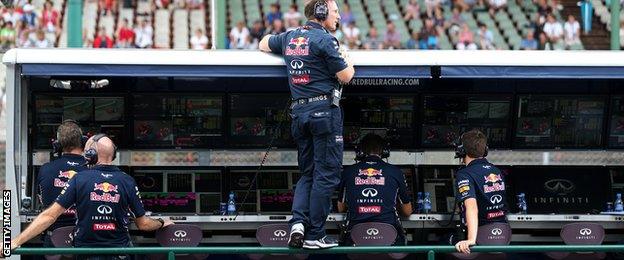
Red Bull won the constructors' championship from 2010 to 2013, but came second to Mercedes in 2014
There has been a fair bit of moaning in some quarters about the new turbo hybrid engines and fuel formula but they needed to happen or F1 could very easily have become prehistoric in its outlook and image.
Motorsport partly exists to develop technology and F1 should be a part of that. And the new rules have certainly done that.
The criticisms of the noise of the engines have died down and even if people were serious about wanting to change it, it is not an easy fix.
The engines are very efficient and, by definition, if you are scavenging energy off a turbo, it is always going to be quieter than an engine without that sort of system.
The new regulations have provided the push the manufacturers wanted, F1 now has more powerful engines doing a season on a third less fuel than before and there has been some fantastic racing.
So, on balance, you have to say the new formula worked, even if a few tweaks might be needed here and there - I still think we talked a little too much about tyres, for example.
MONEY, MONEY, MONEY - OR THE LACK OF IT
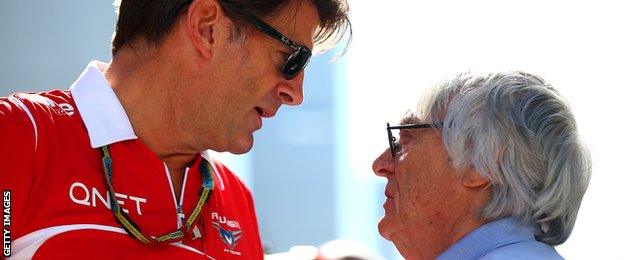
Marussia F1, who have ceased trading, failed to make it to the Abu Dhabi Grand Prix despite making a last bid attempt to compete
In 2002, when I was driving for Toyota in F1, we used something like 440 engines in the course of the season. This year, teams are limited to five. What a difference that is.
So, the big picture is that the push to reduce costs and resources in F1 has made a huge difference.
But there is no doubt the smaller teams are struggling and that costs need to be kept under control.
In the current financial climate, everyone is getting squeezed, even the car manufacturers.
Sponsorship is also harder to come by - and the sponsors who are in F1 want to spend less and get more in return for it.
This is why a team like Sauber has picked the two drivers with the biggest budgets for their line-up in 2015, in Felipe Nasr and Marcus Ericsson. Between them, they are providing something like 40 million euros.
They are both talented but it is probably not the line-up you would choose if you did not have to worry about finances, and it does not do a lot of good for the image of F1 as the pinnacle of the sport.
F1 needs the smaller teams, the privateers. They are the people who stick around - teams like Williams, McLaren, Sauber and Lotus, in its various guises over the years. The car manufacturers come and go.
The argument that the business model needs to be looked at, with a more equitable distribution of wealth, is a strong one.
But the big teams have invested a lot in their resources and they can't just wipe that out. Their existence depends on success, so they cannot just give away what they legitimately negotiated.
Some kind of rebalancing, though, needs to take place to ensure the sport's long-term viability.
LESSONS FROM BIANCHI
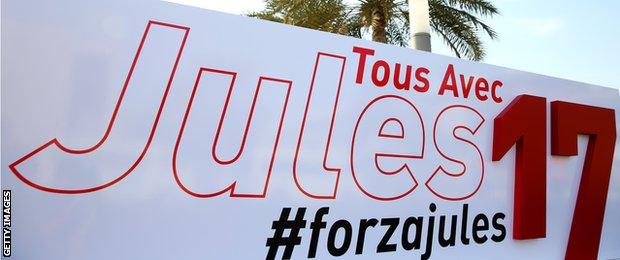
Marussia's Jules Bianchi suffered serious head injuries when he crashed at the Japanese Grand Prix
Everyone feels the absence of Bianchi in the paddock. Such a serious injury to such a young, talented driver was a big shock to F1.
The key lesson is not to make knee-jerk reactions. Governing body the FIA has done exactly the right thing so far, which is to respond in a measured way, analyse what happened and try to learn from that.
It's about improving track and driver safety, but marshal safety as well. And the idea of introducing slow zones when marshals are working on a stranded car - which has been used in sportscars for some years - is a sensible step forward.
LOOKING FORWARD TO 2015
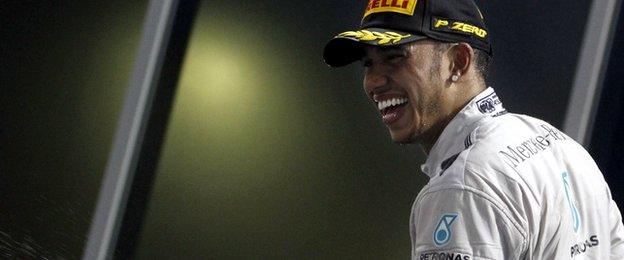
Lewis Hamilton won the world title by finishing 67 points ahead of Mercedes team-mate Nico Rosberg
Both Mercedes drivers will take different things out of the season.
Hamilton has another title under his belt, one he has been trying to win for a long time, and he will come back with a fresh impetus from that.
Rosberg will sit down over the winter and, in that very logical way he has, analyse everything that happened.
He will take a lot of confidence from his 11 pole positions but will have to work out why he lost out in the races. But I am pretty sure he will come back stronger next year.
Ferrari and McLaren are both rebuilding, and the same applies to Red Bull to a lesser extent, with design chief Adrian Newey no longer fully focused on F1, and the departures of Vettel and chief aerodynamicist Peter Prodromou, who has joined McLaren.
Mercedes are highly likely to continue to be the team to beat and I suspect their main opposition will come from Williams.
So the season will likely start as this one ended.
Formula 1 2014 season in numbers
Allan McNish is a former F1 driver and a three-time winner of the Le Mans 24 Hours. He was talking to BBC Sport's Andrew Benson.
- Published18 December 2015

- Published28 November 2014
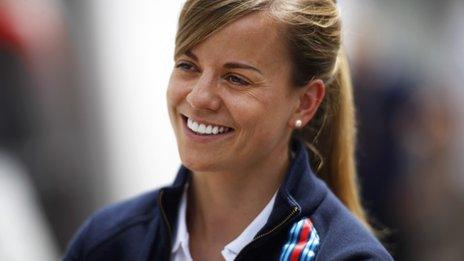
- Published27 November 2014
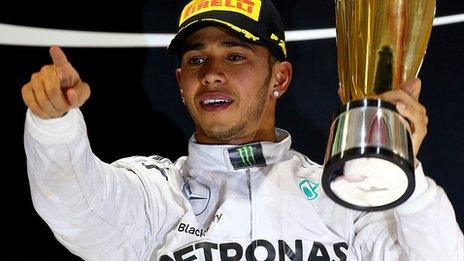
- Published25 November 2014
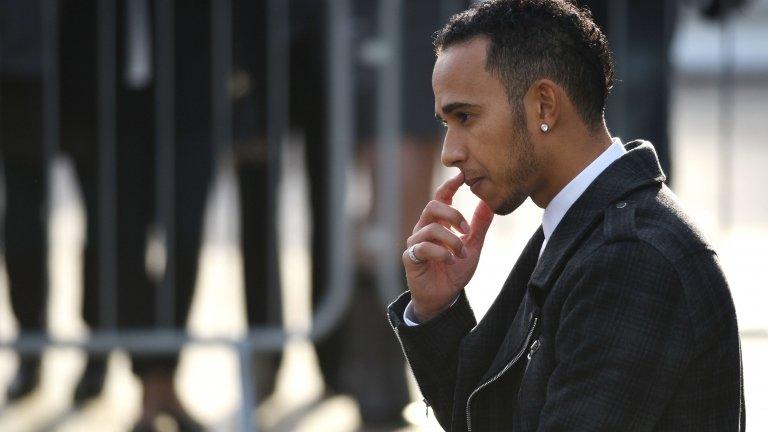
- Published2 November 2018

- Published26 February 2019
